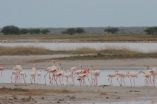(Press-News.org) Countries need to increase co-operation over conservation to protect birds and other wildlife in an era of climate change, according to a new continental-scale study.
Experts have established a new conservation index to help policy-makers to deal with the effects of climate change on birds in Africa, and it could assist governments across the world to protect wildlife areas and help species as climate change forces them to move to new areas.
It is the first categorisation of protected areas to show how conservationists might deal with climate change and the shuffling of the distribution of wildlife species that it will cause. The new tool offers policy-makers essential information to allow them to manage and adapt habitats in coming decades.
An international research team led by Professor Brian Huntley and Dr Stephen Willis, School of Biological and Biomedical Sciences, Durham University, looked at how native African bird species will fare in 803 Important Bird Areas (IBAs) across the continent, if climate change continues as predicted. Birds are a key indicator for conservationists because they respond quickly to change and are relatively easily monitored. IBAs are sites of highest conservation importance for birds, some of which, but by no means all, are existing protected areas.
The team looked at projected future ranges of species of birds and how these coincide with the current network of priority bird sites across Africa. They predict that one third of the IBAs will undergo significant upheaval this century, in terms of the species they contain, due to climate change.
The study shows that there are substantial geographical gaps in the current conservation network and that international cooperation is essential to protect species.
The team produced a series of climate adaptation strategies, which provides a template for action across Africa. It could assist the movement of birds threatened by shrinking habitat and food supplies, across distances of up to hundreds of kilometres, to new climatically-suitable areas. Importantly, the team also highlighted those areas of Africa that are currently unprotected but which could prove crucial in saving species that would fail to be protected in the present IBA network.
The research, funded by the Royal Society for the Protection of Birds (RSPB), and published in the journal Conservation Biology, suggests that hundreds of bird species in Africa will become emigrants, leaving one part of the continent for another in search of food and suitable habitat.
Co-author of the paper, Dr Stephen Willis, School of Biological and Biomedical Sciences, Durham University, said: "The bird map of Africa is set to change dramatically and we need conservation policies that see the bigger picture.
"There are large areas of Africa lacking protected status and many of these areas are predicted to be critically important for bird conservation in the future. We need to be ready to protect remnant populations of birds while also preparing for new colonists.
"We need to improve monitoring, communication and co-operation to make protected areas work across borders. Conservationists and policy makers will have to work together in new ways as networks become increasingly important in protecting species."
Researchers used climate change projections from the Intergovernmental Panel on Climate Change to simulate impacts on African birds over the next 100 years for each of the IBAs and identified which areas could be expected to sustain which bird species.
The results show that the continent will undergo considerable change with areas such as the southern African tropical zone (stretching from Namibia and Angola to Mozambique and Tanzania) projected to have high numbers of both emigrant and colonising species.
Dr Stuart Butchart, Global Research and Indicators Coordinator at research partner BirdLife International, said: "Many areas that are likely to become increasingly important are currently under-protected. Fast-tracking protected-area status for places such as Brandberg and Hobatere in Namibia and managing them appropriately could help species to survive and adapt to climate change.
"Cooperation across borders to preserve and adapt areas so that birds and other wildlife can survive as their habitats change and shift will be essential to conserve biodiversity and maintain the ecosystem services that will help people and communities adapt to climate change."
Some protected areas will be able to maintain a business-as-usual management regime, whilst others will need a new way of working, often across international borders to conserve different species. Increasing the size of the currently protected areas is a potential solution but difficult to enact. The research team believes that other solutions could have positive results.
Dr David Hole, Climate Change Researcher with research partner, Conservation International, said: "Policy action to encourage practices that will make it easier for species to move through the wider landscape will be critical, such as conservation-friendly farming and agroforestry, to ensure species can reach newly climatically suitable areas as climate changes."
"There's a real opportunity here since these types of measures, together with adaptive management of existing Important Bird Areas could not only aid conservation but also help to mitigate climate change by conserving or restoring natural habitats, as well as guiding us to preferred localities for climate mitigation schemes. It's about trying to find those win-win situations."
Winners and losers:
Areas of High turnover, i.e. high immigration and emigration:
Kalahari-Gemsbok National Park (South Africa) – 79% turnover
Hobatere (Namibia) - ensemble turnover 70%
Areas of little change:
Kilombero Valley (Tanzania) - 95% persistence
Waza National Park (Cameroon) - 98% persistence
INFORMATION:
Cross-border conservation vital to protect birds in a climate-change world
2011-02-09
ELSE PRESS RELEASES FROM THIS DATE:
Virtual laboratory predicts train vibrations
2011-02-09
The construction of new rail lines, or the relocation of old ones underground, has increased society's interest over recent years in the vibrations produced by trains, especially among people who live or work near the tracks. Now a study headed by the Polytechnic University of Valencia (UPV) has made it possible to estimate the trajectory of vibrations from the point at which they are generated (wheel-rail contact) through to the ground.
"The model acts as a "virtual train laboratory', meaning that, if the parameters of the train or the track ballast are changed, it is ...
Experts call for greater awareness of the links between diabetes and kidney disease
2011-02-09
The first time that many patients realise that diabetes can affect their kidneys is when they are referred to renal services, according to a multi-cultural study in the March issue of the Journal of Renal Care.
UK researchers who spoke to 48 patients with diabetes attending specialist renal services in Leicester, Luton and Ealing, discovered that awareness of the kidney risks posed by the disease was very low.
"The people we spoke to experienced feelings of surprise, fear and regret when they found out their kidney had been affected" says Professor Gurch Randhawa, ...
Extra testosterone reduces your empathy
2011-02-09
A new study from Utrecht and Cambridge Universities has for the first time found that an administration of testosterone under the tongue in volunteers negatively affects a person's ability to 'mind read', an indication of empathy. The findings are published this week in the journal Proceedings of the National Academy of Sciences.
In addition, the effects of testosterone administration are predicted by a fetal marker of prenatal testosterone, the 2D:4D ratio. The study has important implications for the androgen theory of autism (testosterone is an androgen) and confirms ...
Drug-eluting stents are preferred therapy for revascularization of chronic total occlusions
2011-02-09
A systematic review of medical evidence has determined drug-eluting stents (DES) outperform bare metal stents (BMS) for revascularization of chronic total occlusions. Researchers found coated stents reduce restenosis and target revascularization, offering a safe approach with similar adverse events as BMS. Full findings are available in the February issue of Catheterization and Cardiovascular Interventions, a journal published by Wiley-Blackwell on behalf of The Society for Cardiovascular Angiography and Interventions.
Medical evidence maintains that chronic total occlusions ...
Ancient teeth raise new questions about the origins of modern man
2011-02-09
BINGHAMTON, NY – Eight small teeth found in a cave near Rosh Haain, central Israel, are raising big questions about the earliest existence of humans and where we may have originated, says Binghamton University anthropologist Rolf Quam. Part of a team of international researchers led by Dr. Israel Hershovitz of Tel Aviv University, Qaum and his colleagues have been examining the dental discovery and recently published their joint findings in the American Journal of Physical Anthropology.
Excavated at Qesem cave, a pre-historic site that was uncovered in 2000, the size ...
Researchers identify the genotype of disorders causing cardiac sudden death syndrome
2011-02-09
This release is available in Spanish.
Researchers from the Hospital Virgen de las Nieves of the University of Granada have identified the most frequent mutations in the gene KCNH2 in patients with long QT syndrome.
Long Qt syndrome is a disorder of cardiac ionic channels that approximately affects one in every 2,500 people and may cause torsade de pointes episodes, which can trigger sudden death. This condition usually affects children and adolescents, and it is occasionally mistaken for convulsions, leading to a misdiagnosis of epilepsy.
So far, hundreds of mutations ...
Blinds4Home Introduces its Website for Your Window Blinds Needs
2011-02-09
Blinds4Home opens its doors to people who wish to purchase window blinds for their windows. There is a need for this fixture as you require privacy, if not protection against the glaring sun or the need to preserve the heat during the coldest of winter. Window blinds, vertical blinds, window shades, roller shades and solar shades are made affordable for you to suit your needs. These also come with safety devices to protect your children and your pets.
This store offers different varieties of window treatments that meet your requirements. Their lines of products furnish ...
New Math Software Ties Math Practice With Social Networking To Boost Kids Motivation For Math Work
2011-02-09
Social networks are immensely popular because they feed the users with a few basic but very important needs. Not even social insuccess and difficulties will push users away from these networks. It is thus possible to offer individuals participation within a social network and ask for something in exchange that they would not do otherwise. That's exactly what MathLanders does.
MathLanders enforces sustained math practice by capitalizing on children innate inclination towards online peer competition and acquiring a reputable position in the social hierarchy. The software ...
Wedding & Event Planning Firm Receives Prestigious Industry Award
2011-02-09
The Bridal Solution is celebrating their second anniversary in style after receiving the prestigious "WeddingWire Bride's Choice Award" for 2011 in the wedding and event coordination category. Founder and owner, Natalie Imhoff, takes the success in stride. Imhoff notes, "We are obviously pleased to receive the award. We know our clients want their weddings and other events to be unique, memorable and proceed flawlessly. So, they seek a firm with a stellar reputation. I'm pleased The Bridal Solution has achieved that status. For us, 2011 will be a year filled with fresh ...
Learn Ways to Heat Up Valentine's Day from Top Relationship Expert Dr. Patty Ann Tublin
2011-02-09
The mercury may be dipping below zero in parts of the country, but Dr. Patty Ann Tublin has a number of ways for couples to heat things up this Valentine's Day. Dr. Patty Ann, a world-renowned relationship expert who helps couples stop fighting and achieve happiness and intimacy, has just released a new article on her web site titled, "5 Easy Ways to Heat Up the Flames of Love & Passion on Valentine's Day." It's available now at http://bit.ly/fG7BAv
In the article, Dr. Patty Ann provides five easy things couples can do on Valentine's Day to show they care and celebrate ...


